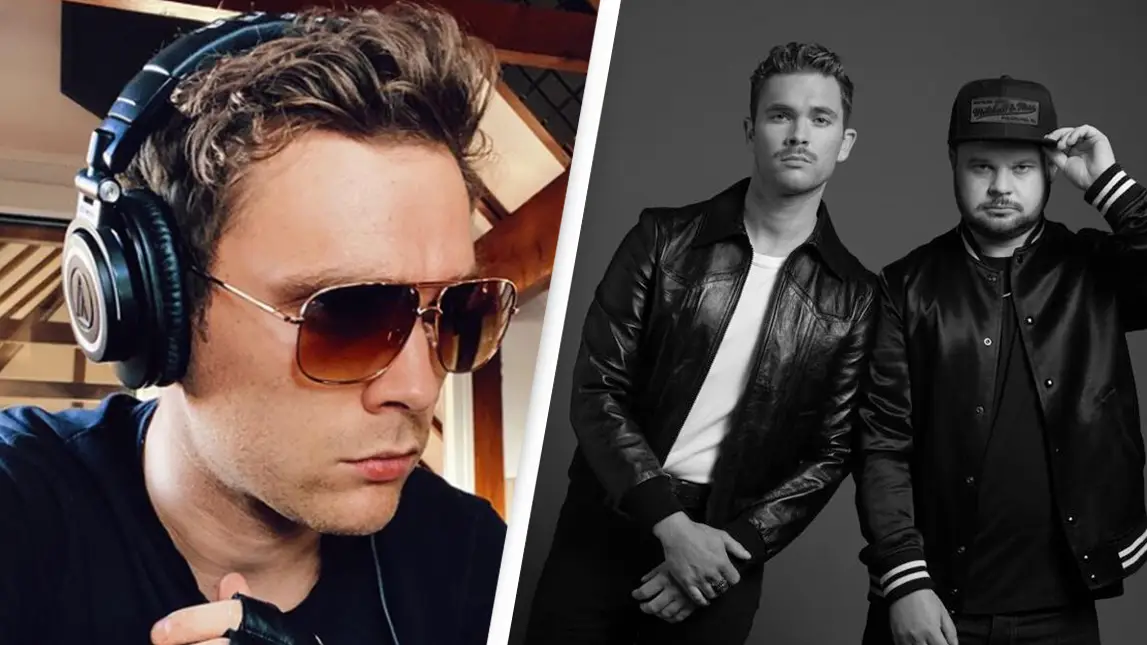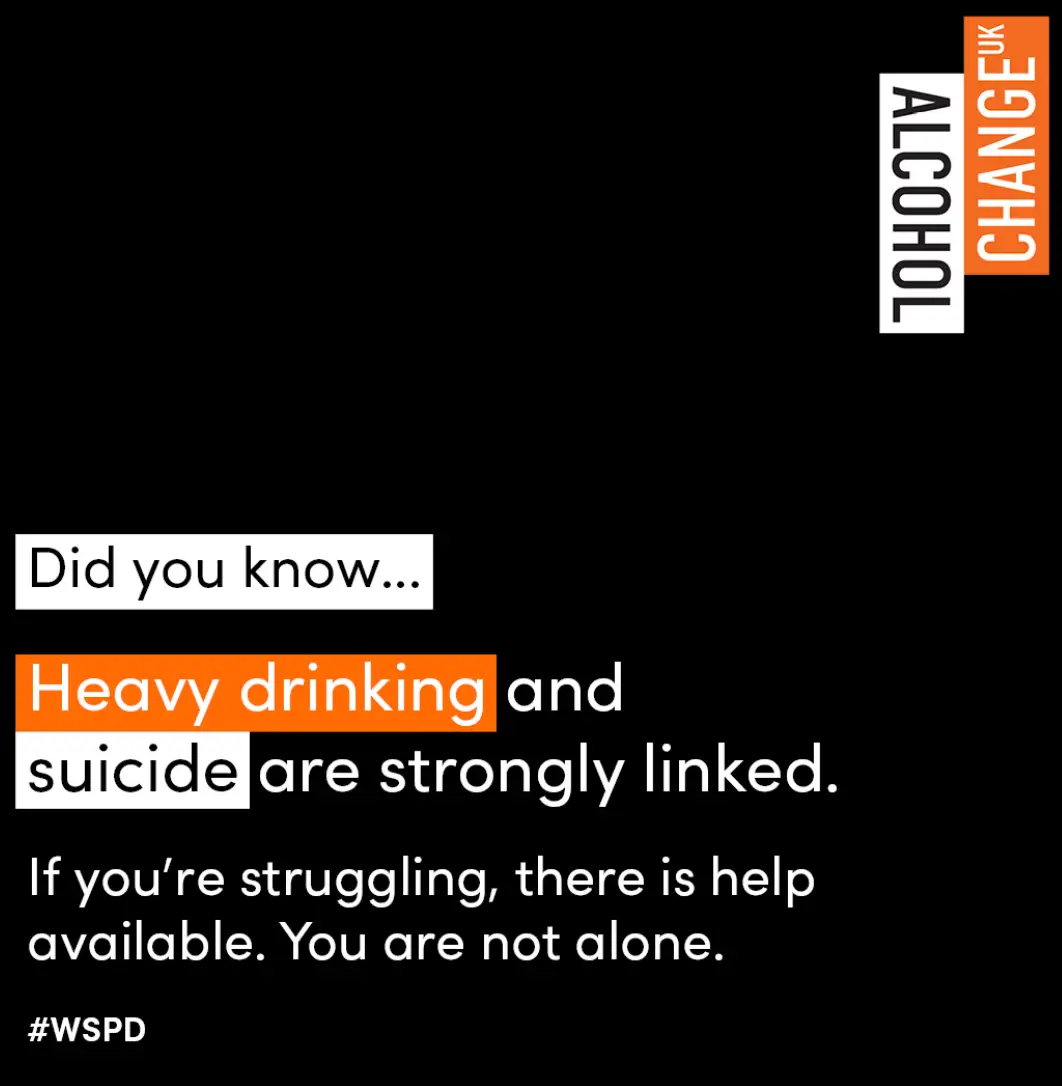
Warning: This article contains discussion of alcoholism and suicide which some readers may find distressing.
"The one thing... I don't know... I know what I want to say, but I don't know how to say it. I guess, you know what really scared me? Was during lockdown, the amount of people that were innocently using their social media to encourage drinking."
Mike Kerr, from rock duo Royal Blood, has been clean and sober for nearly three years now, however, that is not to say that time - and particularly the coronavirus pandemic - came without its challenges.
In advance of this year's 'Movember' – held every November to raise awareness of men's health issues – Mike opened up about alcoholism and addiction being crucial issues that 'need to be talked about more within the conversation', explaining he feels they've often previously been 'left behind'.
Advert
Compared to women, men are twice as likely to binge drink, according to the Centers for Disease Control and Prevention. Moreover, seven percent of men – compared to seven percent of women – had an alcohol use disorder in 2019.
Mike said it was a mixture of loneliness and turning to alcohol that took him to one of the darkest places he has been in his life.
He said: "I think throughout touring in a band, that process and that experience acted as somewhat of a catalyst for my mental health.
"It's such a turbulent way to live your life anyway, even if you see yourself as someone who's quite stable. It's so wild and can be a very lonely experience, but also exciting. That's kind of where I felt things become a problem."
Mike described using 'drugs and alcohol to help deal with [his] mental state', and how it resulted in a 'period of time that was notably bad'.
While Mike has since been doing well and is 'thankful to be out on the other end', he questions why alcoholism and addiction are not spoken about more in 'these sorts of conversations' around mental health particularly when it comes to men - men more than three times as likely to die by suicide than females, and more likely to have been drinking prior to suicide.
Excessive drinking of alcohol also increases the risk of cancer of the mouth, throat, oesophagus, liver, and colon, which are all more common among men. It also increases the risk of prostate cancer.
Yet in a lockdown that united everyone through feelings of isolation and despair, the continued stigmatisation and lack of awareness or understanding towards addiction or alcoholism still felt very prevalent to Mike.

"I was going to say something about drinking, because I think in a time like we've just been through, with being isolated and it being such a difficult time, I think that drinking and using any kind of drug is a terrible idea for your mental health. And it's something that still doesn't usually get mentioned in conversations like these," he explained.
Alcohol was like 'liquid depression', Mike said, and images of people drinking more to get through the pandemic really tested him in what was already an isolating and bleak time.
Mike said: "People cheers-ing... I was like, what kind of messages are you sending? Someone might be really struggling and you've just sort of pushed them along.
"For me, it helped the state of my mental health massively to not drink. If you're someone who does really struggle with your mental health and you are using drugs, you're not giving yourself any kind of fighting chance. So know that there is help out there for that as well. Like NA and amazing hotlines and just talking to people."
Even now the pandemic is slowly petering out, Mike acknowledged the pressure that may have subsequently arisen to go out and make up for two years of no fun; to drink, party and overcompensate for 'lost' time.

Mike stressed that, despite this pressure, the time hasn't been wasted: "I mean, my advice is you haven't lost two years – you've experienced two years.
"Also, that it's okay to just exist. And this is something I'm trying to master the art of.
"The narrative we're kind of given is you can't even go on f*cking YouTube without something saying you should invest in this stock, or be doing this, or a million sit ups a day or telling you what to eat. But, it is okay to just exist."
Mike highlighted some of the positive experiences that came out of lockdown, of people having the time to have a breather and re-evaluate, 'learning to sit with yourself and your own feelings and thoughts. To listen to what your body and your mind is saying to you.'
However, he did note the pressures of the pandemic have overflowed out the other side too, as we slowly return back to normal life.
"Oh god, I mean the pressures of it ending and going back out and being seen to have a good time, I guess my advice really, and again it's something I'm constantly trying to master the art of, is that appearances don't mean anything basically," he said.
Life should be 'about what it feels like, not what it looks like', Mike said. "Sometimes the two don't look the same, you know?"
He added: "But there's also a part of me, if I'm being really honest, that knows that you have to go out there and make some mistakes and realise. I think most of us have to learn the hard way – I certainly did."
The pressures of social media, as a musician who relies on it to spread the word about new songs, albums and tours, was an unavoidable topic. 'I'm not singing a new song here, but we all know it's not real life. We all know that social media and people's own personal profiles are just a highlight reel. It's what they, and we, want to believe our lives are. It's very rarely a reality,' Mike said.
Because of social media's purposefully addictive nature, Mike 'puts limitations on it and has rules in place', such as only using it in 'certain hours of the day' or having a time to 'stop looking at it'.
"It's consuming. I think it's crucial to try to find some kind of moderation, or it's like being on your own in a room full of chocolate," he said.
Mike noted the 'shock' he still felt as a result of the pandemic as no one saw it coming. He likens it to 'a full stop to everyone's life' where 'no one had any control'.
The concept of control links to mental health and particularly alcoholism and addiction, and the pandemic severely complicated many people's battles with controlling certain areas of their lives.
The lockdown exacerbated many of the problems that one in eight men face in their daily lives, 'such as depression, anxiety, panic disorder or obsessive-compulsive disorder', as per the Mental Health Foundation.
Many people were suddenly forced to stay at home, unable to work or see family, and were subsequently served 'the perfect cocktail for a pretty sh*t time'.
However, one positive to arise out of a series of heart-breaking and extremely tricky few years is how everyone has been brought together through this shared experience.

"Whether you think you're someone who has struggled with mental health or not, I think if there's one thing we can all share from this pandemic, and can at least all recognise, is this shared experience of isolation, literally and mentally. So I think that the Movember campaign couldn't be more relevant," Mike said.
Mike's believes there aren't 'two camps' of those who have mental health issues and those who don't. "We all do – I think it's part of the human experience," he explained.
"Especially in how we're all going through this together, and it's so unnecessary to experience life alone. Being a human being is f**king weird. It's strange. The human experience is a bizarre one," he added.
Mike hopes to distil the idea that mental health is never just one person's problem. While he agrees it can make you feel alone and that not talking about it can heighten this, he also warns that not speaking about it 'can create this illusion that the experience is unique to you only, that you have this bespoke problem, and that there's something wrong with only you'.
"It's not until you, not just talk about it, but find someone that understands and shares the same things you do – that at least really helped me in the past," he said.
"The biggest thing for me is the difficulty around men communicating with other men about their mental health. It's always a very uncomfortable thing for some reason," Mike explained.
He noted how 'incredibly awkward' he finds it to talk with his male friends, bar a few of his closest mates, although he feels able to open up to any woman. 'For some reason, even if it's a friend of a friend or somebody I don't even know that well, I have an ability where I just know that it's open and okay,' he said.
Suicide remains the single biggest killer of men under the age of 45, according to mental health organisation CALM. Of the 125 lives lost every week to suicide in the UK, 75 percent of them are male.
Mike said: "I think the only way that it's ever going to change, is by making a start and normalising that conversation. In the same way of saying, 'How was your day?', or 'What have you been up to?', being like 'How is your mental health?' or 'How are you feeling?'
"That needs to become a part of an average conversation, because it is normal to experience mental health ups and downs, and it should be okay to talk about it."
As well as Royal Blood, the Movember campaign has welcomed Professor Green, Top Boy star Ashley Walters, YouTuber Joe Sugg and England rugby player Jonny May, among many others.
Mike first heard about Movember when he was 21 and joked that he was 'mainly drawn in by the idea of growing a tache'. Although, it's important to note, you don't actually need to be able to grow a moustache to get involved.
To mark the occasion, Mike suggested getting a group together and coming up 'with something you all have to do with which is outrageous. If there's a group of you who do that, it opens up that conversation and gets you talking about it with ease.'
Mike advised 'setting a proper challenge and doing it with a group of people'. "It would be a shame to do something like that alone and kind of defeats the point of what the charity is about. Have some fun with it," he said.
If you're currently struggling, find someone 'you really trust, speak to them and speak out', Mike said.
"That's the first step, so know that you're not alone, and that you don't need to struggle alone."
"Men's mental health, testicular cancer, and prostate cancer – those three things don't go away every year. You don't have to wait for a stag-do to speak about something and with Movember, you can actually do some good in the world."
Mike Kerr joins men’s health charity Movember as one of the faces of their 2021 annual fundraising campaign. Sign up at Movember.com to help change the face of men’s health.
If you've been affected by any of the issues in this article and want to speak to someone in confidence, you can contact men's health charity Movember here.
Topics: Mental Health, Health, Cancer, Music, Celebrity